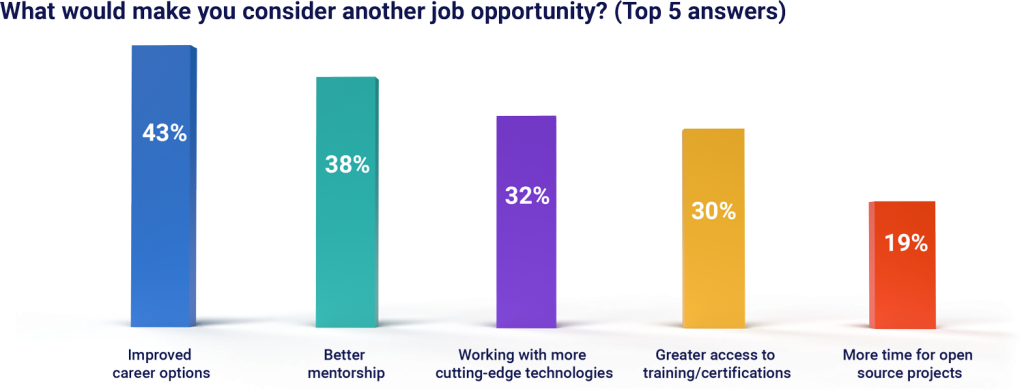With the ongoing digitization of business and life, it's not a surprise that 58% of IT executives say they are planning on increasing emerging technology investments. At the same time, a global shortage of development talent is pushing companies to look for ways to stand out while hiring and retaining developer talent. The first step is to figure out why software developers quit in the first place.
A 2022 study by EnterpriseDB reveals that less than half (46%) of developers are "very satisfied" with their jobs. With 44% saying that they are satisfied but are keeping their options open and would be open to leaving for a better situation, and 10% reporting being dissatisfied with their current job.
The honeymoon period didn't last for 28% of new hires who had a lower opinion of their employer a year after joining a team. If your company struggles with retention in the first 18 months, onboarding and new employee support may be areas to review for improvement.
It's tempting to think that building long-term or even loyal teams is impossible today. However, the data shows that developers do want a satisfying relationship with their employers. They aren't signaling maximum schedule flexibility and huge comp as their highest values.
The good news is that some of what developers are looking for is within employers' control. Companies willing to lean in with mentorship, rich opportunities for continued learning, and clear paths to career advancement will attract and retain the best talent.
The data shows that developers do want a satisfying relationship with their employers. They aren't signaling maximum schedule flexibility and huge comp as their highest values. Click To TweetIn this post, we'll look at some non-monetary reasons developers quit and some actions you can take to increase your retention.
Why Software Developers Quit
We all know the workplace landscape has changed since 2021, fueled by more work possibilities and a massive shift to hybrid and fully remote teams. The EnterpriseDB study asked developers what would make them consider leaving their current job. Below are the results:
- Pay and benefits - 46%. Pay is still a primary consideration, yet less than half cite it as the most important.
- Strong mentoring programs - 38%
- Time and opportunities for training and certifications - in 2022, 30% said this was important, compared to 17% in 2021.
- Better career advancement options - this figure almost doubled, from 24% in 2021 to 43% in 2022

Another study by LaunchDarkly shows that when leadership prioritizes improving developer outcomes, 91% of developers say they are very satisfied with their jobs.
1. Negative Team Dynamics
No one wants to wake up daily and dread interacting with their leadership or team. Today's teams are under more pressure than ever, and the tone leadership sets make all the difference in whether team members stay or leave.
Software deployment is moving from infrequent "big bang" releases to weekly or daily releases. A report from the software platform LaunchDarkly revealed that 55% of teams are releasing new code multiple times per week or even per day.
Not surprisingly, 99% of developers say they want to feel safe when taking risks in deployment. As more frequent deployments become the norm. Yet 67% of developers have left a job due to pressure around minimizing deployment errors or know someone who has.
In 1999 Harvard's Amy Edmondson introduced the concept of "psychological safety," where employees and teams feel safe speaking up and taking risks with work-related content. In fact, psychological safety is critical for team performance.
Julia Rozovsky, people analytics manager at Google, said, "We learned that there are five key dynamics that set successful teams apart from other teams at Google. Psychological safety was far and away the most important." (source)
In fast-paced work environments, leadership sets the tone - is more pressure a positive or a negative? When the message is "produce faster and don't screw up," the effect on teams is very different than when a company encourages a culture of healthy risk-taking and tolerance for failure as a way of learning.
2. Software Developers Quit from Boredom
Top developers tend to be very intelligent and curious. Interesting work is an important consideration for high-performing team members.
For example, companies likely already know that supporting legacy code’s "technical debt" is a red flag for developer satisfaction. And while more than 50% of developers at innovative companies are satisfied with their job, not every team needs to be working on a Mars space suit to keep members engaged.
Attractive workplaces focus on creating a culture of innovation. Even companies with less-than-cutting-edge products can develop a culture of innovation and look for ways to support and engage developers through support for collaborative side projects.
For example, Atlassian, who acquired Trello in 2017, sponsors ShipIt Days. These are 24 hours stints where teams can work on any project they choose.

ShipIt days encourage people to reach out across different teams, which helps communication and strengthens a sense of belonging to the bigger picture.
3. Lack of Learning Opportunities
Technology and software skills keep evolving and show no sign of slowing. Developers without opportunities to learn new skills will likely seek positions supporting continued learning.
What kind of training do developers want to access? The graphic below from EnterpriseDB breaks it down. Developers want to keep up with emerging tech (e.g., cloud), core technologies, and compliance. Cybersecurity is also a hot hiring area, so it's no surprise that security training is a draw. What is surprising is that 13% of companies still don't offer it.

A hands-on approach is best when offering programs, especially as a recruiting advantage. It's not enough to just provide information and perhaps a stipend. Companies that walk the talk and provide support for implementing continued learning opportunities and employee time to focus on them will develop stronger relationships with their developers and teams.
4. Poor Team Communication
After the global pandemic, remote work has gone mainstream, and development teams are more distributed than ever. While this offers employees flexibility, it also introduces new challenges for communication. Team cohesion and communicating goals are much more challenging in a fully remote setting. Remote comms done wrong can lead to a lack of clarity and eventually contribute to burnout.
Kong, an API management and microservice platform, prioritizes empathetic, frequent team communications. They also support inclusivity and asynchronous communication for remote teams across time zones.
Finally, setting up in-person meetings, even just twice a year, can have a positive effect on team bonding and communication. In fact, one advantage of nearshoring vs. outsourcing to different hemispheres or continents is the ability to more easily meet in person.
5. Software Developers Quit Over Unclear or Unrealistic Expectations
Unclear expectations are related to poor communication. When leadership communication is weak, and expectations are unclear, it sets the stage for team stress and developer attrition.
Companies often communicate expectations via processes, yet it's essential to realize that clarifying expectations does not always mean more process and oversight. In the EDB study, 61% of respondents reported that their company's processes hinder their ability to innovate and try new things.
Autonomy is also very important to high-performing employees. Industry leaders say reducing process friction is critical to enabling people to do their best work. No one works well with Slack pinging on the reg and Zoom calls scattered across a calendar. For example, ClickUp managers encourage developers to time-block their calendars for focus work.
When management sets the expectation that employees have the autonomy to time block and turn off their notifications, developers are more productive and feel less stressed than those who operate in an environment of the "always on" mentality.
6. Lack of Recognition or Appreciation
After interviewing thousands of people throughout her career, Oprah Winfrey said the common desire from every interviewee was, "Do you see me? Do you hear me? Does what I say matter?"
Recognition is a natural and universal human desire. Positive, authentic public recognition is a powerful non-monetary way of increasing developer satisfaction. In the Atlassian example above, the ShipIt days allow developers to showcase their creativity and skills.
It's also a natural human trait to point out what is going wrong and take it for granted when things go smoothly. Team leaders who feel under the gun for schedules and team performance may need to build a habit of giving out as many kudos as critiques or suggestions for improvement.
Moving Ahead
A changing world of work and increasing demand for software development are two trends that don't show any sign of slowing soon. It takes time to adjust, build and retain strong development teams.
At Sharkbyte, we have years of experience consulting clients on their software project roadmap and different options for hiring team members. Every project is different. We are happy to help you weigh your options. Contact us today!



